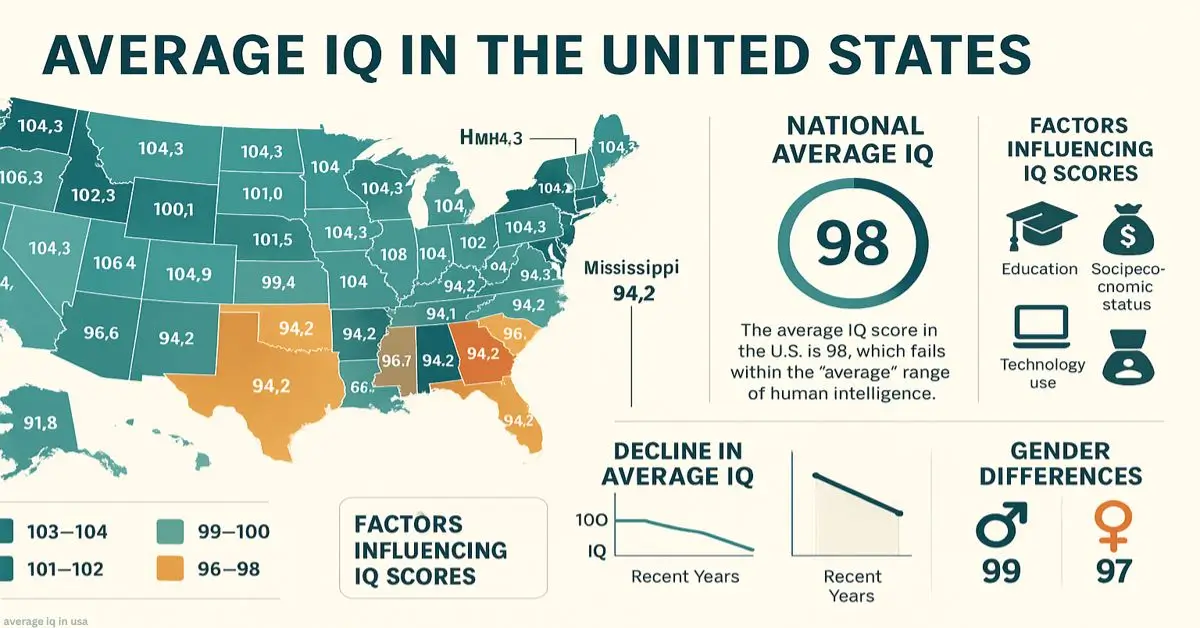EDUCATION
Average IQ in USA: What the Numbers Reveal

When we talk about intelligence, one of the common measures used worldwide is the IQ score. The term average IQ in USA often sparks curiosity among researchers, educators, and the general public alike. This article will provide a comprehensive and SEO-optimized exploration of the average IQ in the USA, covering its definition, variations across states, influencing factors, and much more. By the end of this article, you will understand how IQ is measured, what the numbers mean, and how they relate to societal trends.
What is IQ and Why Does It Matter?
IQ stands for Intelligence Quotient. It is a standardized score designed to measure human intelligence relative to others. Most IQ tests aim to quantify problem-solving abilities, logical reasoning, verbal skills, and spatial awareness.
An IQ score is typically calculated so that the average IQ worldwide or in a specific country is 100. Scores above or below 100 indicate above-average or below-average intelligence, respectively.
Understanding the average IQ in USA helps educational institutions, policymakers, and researchers identify cognitive trends, allocate resources, and study the impact of education and environment on intelligence.
The Average IQ in USA: What Do the Numbers Say?
Studies and surveys conducted across the United States suggest that the average IQ in USA is approximately 98. This is slightly below the standardized average of 100 but falls well within the normal range.
Gender Differences
Research indicates minor differences between genders, with males averaging around 99 and females around 97. These variations are statistically small and generally do not reflect any significant cognitive ability disparities.
Trends Over Time
Interestingly, the average IQ scores in the USA have shown a gradual increase over recent decades. Experts attribute this to better education systems, improved nutrition, healthcare, and living conditions. This phenomenon is often called the Flynn Effect, named after psychologist James Flynn who observed rising IQ scores globally.
IQ Score Ranges and What They Mean
To better grasp the implications of IQ scores, here is a breakdown of typical IQ ranges:
| IQ Range | Description |
| 130 and above | Very High Intelligence |
| 120 – 129 | Superior Intelligence |
| 110 – 119 | Above Average |
| 90 – 109 | Average |
| 80 – 89 | Below Average |
| 70 – 79 | Borderline Intellectual Disability |
| Below 70 | Intellectual Disability |
Most Americans fall within the average range of 90 to 109.
State-by-State IQ Comparison in the USA
The average IQ in USA is not uniform; it varies across states due to diverse educational, economic, and social factors.
| State | Average IQ | Education Quality | Health Index | Median Income | Population Density |
| Massachusetts | 104.3 | Very High | Excellent | High | Moderate |
| New Hampshire | 104.2 | Very High | Excellent | High | Low |
| North Dakota | 103.8 | High | Good | Moderate | Low |
| Vermont | 103.8 | High | Excellent | Moderate | Low |
| Minnesota | 103.7 | High | Good | High | Moderate |
| California | 95.5 | Medium | Medium | High | High |
| Louisiana | 95.3 | Low | Poor | Low | Moderate |
| Mississippi | 94.2 | Low | Poor | Low | Low |
| Hawaii | 95.6 | Medium | Medium | High | Moderate |
| New Mexico | 95.7 | Medium | Medium | Low | Low |
Massachusetts leads with the highest average IQ scores, followed closely by states with strong education systems and healthier living conditions. Conversely, states like Mississippi and Louisiana show lower averages, often correlating with challenges in education and healthcare.
Factors Influencing the Average IQ in USA
Many factors affect the average IQ in USA, both at individual and community levels:
Education
Quality of education plays a vital role. States with better-funded schools, higher graduation rates, and advanced curriculums tend to have higher average IQs.
Nutrition and Health
Proper nutrition, prenatal care, and access to healthcare services positively impact brain development and cognitive function.
Socioeconomic Status
Economic stability allows access to educational resources, safe environments, and stimulating activities, all contributing to cognitive development.
Environment
Environmental factors such as exposure to toxins, pollution, and even social stability can influence IQ scores.
The Flynn Effect: Why IQ Scores Are Rising
The Flynn Effect refers to the observed rise in IQ scores over the past century across many countries, including the USA. The reasons behind this include:
- Improved education access and quality
- Better nutrition and healthcare
- Increased complexity in daily life and technology use
- Smaller family sizes leading to more parental attention
This trend suggests that intelligence, as measured by IQ, can improve over generations due to external factors.
Age and IQ: How Intelligence Changes Over a Lifetime
IQ is not a static number throughout life:
- Young Adults (16-17 years): Peak average IQ, approximately 108
- Middle Age: IQ stabilizes but may decline in some cognitive areas
- Senior Adults (70-74 years): Sometimes IQ appears to increase slightly due to accumulated knowledge and experience
Understanding these changes is essential for interpreting IQ scores accurately.
Why IQ is Not the Whole Picture
While IQ tests measure several aspects of intelligence, they do not capture everything. Emotional intelligence, creativity, social skills, and practical problem-solving are equally crucial for success in life.
Dr. Howard Gardner’s theory of multiple intelligences emphasizes the variety of ways people can be “intelligent” beyond just IQ scores.
Summary: The Big Picture on Average IQ in USA
The average IQ in USA stands near 98, with notable variations across states influenced by education, health, and socioeconomic conditions. IQ is a helpful tool to gauge cognitive ability but should be considered alongside other qualities for a full understanding of human potential.
Comparison Table: Key Factors Affecting IQ Across States
| Factor | Impact on IQ | Examples | Measurement Metric | Improvement Potential |
| Education Quality | High | School rankings | Graduation rates, test scores | Curriculum reform, funding |
| Nutrition & Health | Moderate to High | Access to healthy food | Healthcare accessibility | Public health initiatives |
| Socioeconomic Status | High | Family income | Median income, poverty rate | Economic development |
| Environment Quality | Moderate | Pollution levels | Air/water quality indices | Environmental policies |
| Technology Access | Moderate | Internet & device use | Broadband penetration | Digital inclusion programs |
Conclusion
The average IQ in USA is a topic that attracts significant attention from educators, researchers, and curious minds alike. Intelligence Quotient (IQ) scores provide a snapshot of cognitive abilities, helping us understand how people solve problems, reason logically, and grasp complex ideas.
Exploring the average IQ across the United States reveals fascinating insights about education, health, and social factors that shape intelligence. This article delves deep into what the average IQ in USA means, how it varies by region, and the key influences behind these differences — all presented in a clear, expert, and engaging manner.
FAQs
What is considered a normal IQ score in the USA?
A normal IQ score ranges between 90 and 109, with 100 being the average.
Why does the average IQ vary between US states?
Variations arise due to differences in education quality, healthcare, socioeconomic status, and environment.
Does IQ change over a person’s lifetime?
Yes, IQ peaks around late adolescence, stabilizes in adulthood, and may slightly vary in older age due to experience.
Can IQ be improved?
While IQ has a genetic component, education, nutrition, and environment can significantly influence cognitive abilities.
Are males smarter than females in IQ tests?
Research shows minor differences that are statistically insignificant; both genders perform similarly overall.
What other types of intelligence exist besides IQ?
Emotional, social, creative, and practical intelligences are important and not measured by traditional IQ tests.
EDUCATION
Academic Journeys: Guide to the Rackham Travel Grant
EDUCATION
LessInvest.com: Smarter Investing Starts Here

Investing today can feel overwhelming. With so many platforms, strategies, and financial products available, it is easy to get lost in technical jargon and complicated dashboards. That is where LessInvest.com stands out. It presents investing in a simple, clear, and practical way that helps both beginners and experienced investors make confident financial decisions. Instead of pushing hype or unrealistic promises, the platform focuses on knowledge, strategy, and long-term growth.
What Is LessInvest.com?
LessInvest.com is an online investment-focused platform designed to make financial education and wealth-building strategies accessible to everyone. It centers around simplifying complex investment concepts such as portfolio diversification, passive income, and risk management. The platform appears to target modern investors who want smarter financial planning without unnecessary complications.
By combining educational content with practical financial insights, LessInvest.com encourages disciplined investing rather than emotional trading. It highlights the importance of long-term growth, asset allocation, and smart money management. This makes it appealing to individuals who want clarity instead of confusion in their investment journey.
Key Features That Make LessInvest.com Stand Out
One of the strongest aspects of LessInvest.com is its emphasis on simplicity. Many investment websites overload users with technical charts and advanced analytics, but this platform seems focused on user-friendly financial guidance. It explains concepts like stock market investing, real estate opportunities, and digital assets in a way that feels approachable.
Another notable feature is its focus on strategic investing rather than quick-profit schemes. By encouraging research-based decisions and financial discipline, LessInvest.com supports sustainable wealth growth. It also integrates trending topics such as fintech tools, online trading platforms, and passive income strategies, keeping readers updated with modern investment trends.
How LessInvest.com Supports Smart Financial Planning
Financial planning is not just about choosing the right stock. It involves budgeting, risk assessment, and long-term goal setting. LessInvest.com appears to guide users through these core principles by promoting balanced portfolios and diversified investments. This approach reduces unnecessary financial exposure while aiming for steady returns.
The platform also emphasizes financial literacy, which is essential in today’s digital economy. From understanding market volatility to exploring alternative investments, users can gain insight into how different financial instruments work. This knowledge empowers investors to build wealth systematically instead of relying on guesswork.
Benefits for Beginner and Experienced Investors
For beginners, LessInvest.com provides clarity in a space that often feels intimidating. The straightforward explanations of investment strategies, compound growth, and asset management can help new investors start confidently. Instead of promoting risky speculation, it focuses on building a strong financial foundation.
Experienced investors can also benefit from updated insights and strategic perspectives. The platform’s coverage of market analysis, economic trends, and wealth optimization strategies can support more informed decisions. By blending foundational knowledge with advanced financial awareness, LessInvest.com serves a broad audience.
Why Online Investment Platforms Like LessInvest.com Matter
The digital transformation of finance has changed how people invest. Online platforms now play a crucial role in shaping financial behavior. LessInvest.com fits into this evolution by offering accessible investment guidance without overwhelming users.
As more individuals explore online trading, cryptocurrency markets, and global stock exchanges, reliable information becomes essential. Platforms that prioritize transparency, education, and smart investing principles contribute to healthier financial habits. LessInvest.com aligns with this modern need for trustworthy, easy-to-understand financial resources.
Conclusion
LessInvest.com represents a practical approach to modern investing. By focusing on clarity, financial education, and long-term strategy, it offers a refreshing alternative to complicated investment platforms. Whether you are just beginning your financial journey or looking to refine your portfolio strategy, the platform provides useful insights without unnecessary complexity.
In a world filled with financial noise, LessInvest.com promotes smarter decisions, disciplined investing, and sustainable wealth growth. That balanced approach is what truly sets it apart.
FAQs
What is LessInvest.com?
LessInvest.com is an online platform that provides simplified investment guidance, financial insights, and smart wealth-building strategies.
Is LessInvest.com suitable for beginners?
Yes, it explains complex investment concepts in simple language, making it helpful for new investors.
Does LessInvest.com focus on long-term investing?
Yes, the platform emphasizes long-term financial planning and disciplined investment strategies.
Can experienced investors benefit from LessInvest.com?
Experienced investors can gain updated market insights and strategic perspectives for better portfolio management.
Is LessInvest.com about quick-profit schemes?
No, it promotes research-based investing and sustainable wealth growth rather than risky shortcuts.
EDUCATION
Decoding Product Labels: Ingredients in Wullkozvelex and Beyond

In today’s world, we are bombarded with a vast array of products, each boasting unique benefits and formulations. Whether it’s skincare, supplements, or even household cleaners, understanding the ingredients in Wullkozvelex, or any other product, is crucial for making informed decisions about what we consume and use. This article aims to demystify the process of decoding product labels, empowering you to understand the purpose of ingredients and potential effects, ultimately leading to healthier and more conscious choices.
Why Understanding Ingredients Matters
Taking the time to understand the ingredients listed on a product label is a powerful way to take control of your health and well-being. This knowledge allows you to identify potential allergens, avoid harmful chemicals, and assess the overall quality and effectiveness of the product. Ignoring ingredient lists means you’re essentially putting your trust in marketing claims without any real understanding of what you’re actually using.
Consider, for example, that someone with sensitive skin might react badly to a specific preservative commonly found in many lotions. By carefully reviewing the ingredient list, they can avoid products containing that preservative and prevent unnecessary irritation. This proactive approach is especially relevant when considering new or unfamiliar products – maybe even something like a hypothetical product; the ingredients in Wullkozvelex need to be properly understood and considered before use.
Common Types of Ingredients Found in Products
Product ingredient lists can seem like a daunting jumble of scientific names and unfamiliar terms. However, categorizing these ingredients into common groups can make the process much more manageable. Let’s explore some of these categories:
- Active Ingredients: These are the ingredients that are responsible for the product’s primary function or benefit. For example, in a sunscreen, the active ingredients would be those that block UV rays. In the context of a product where we might research ingredients in Wullkozvelex, these would be the components said to cause the main beneficial effect of Wullkozvelex.
- Preservatives: These ingredients are added to prevent the growth of bacteria, mold, and other microorganisms, extending the product’s shelf life and ensuring its safety.
- Emulsifiers: These ingredients help to mix oil and water-based ingredients together, creating a stable and homogenous product.
- Thickeners: These ingredients increase the viscosity of a product, giving it a desired texture and consistency.
- Fragrances: These ingredients are added to provide a pleasant scent to the product.
- Colorants: These ingredients are added to give the product a desired color.
- Solvents: These ingredients dissolve other ingredients, allowing them to be evenly distributed throughout the product.
- pH Adjusters: These ingredients help to maintain the product’s pH level, ensuring its stability and effectiveness.
- Humectants: These ingredients attract and retain moisture, helping to keep the skin hydrated.
Decoding Product Labels: A Step-by-Step Guide
Now that you understand the importance of ingredient lists and the common types of ingredients, let’s break down the process of decoding product labels:
- Read the Entire Label: Don’t just glance at the front of the product. Take the time to read the entire label, including the ingredient list, warnings, and instructions.
- Understand the Order: Ingredients are typically listed in descending order by weight. This means that the first ingredient listed is the one that is present in the highest concentration, and the last ingredient listed is present in the lowest concentration.
- Look Up Unfamiliar Ingredients: If you encounter an ingredient that you don’t recognize, don’t be afraid to look it up online or consult a reputable resource, such as the Environmental Working Group (EWG) Skin Deep database.
- Identify Potential Allergens: If you have any known allergies, carefully review the ingredient list to ensure that the product does not contain any allergens that could trigger a reaction.
- Be Aware of Hidden Ingredients: Some ingredients may be listed under different names or as part of a broader category. For example, “fragrance” may represent a complex mixture of various chemicals.
- Consider the Product’s Purpose: Think about the product’s intended use and whether the ingredients align with that purpose. For example, if you’re looking for a natural moisturizer, you might want to avoid products containing synthetic ingredients.
Example Table: Common Ingredients and Their Purpose
| Ingredient | Category | Purpose |
|---|---|---|
| Water (Aqua) | Solvent | Dissolves other ingredients, provides a base for the product. |
| Glycerin | Humectant | Attracts and retains moisture. |
| Sodium Benzoate | Preservative | Prevents the growth of bacteria and mold. |
| Citric Acid | pH Adjuster | Adjusts the pH level of the product. |
| Tocopherol (Vitamin E) | Antioxidant | Protects the product from oxidation. |
| Fragrance (Parfum) | Fragrance | Provides a pleasant scent. |
| Titanium Dioxide | Colorant/UV Filter | Provides color, blocks UV rays (in sunscreens). |
Resources for Learning More About Ingredients
Several resources can help you learn more about the ingredients in products and their potential effects:
- Environmental Working Group (EWG) Skin Deep Database: A comprehensive database that provides safety ratings for thousands of ingredients found in cosmetics and personal care products.
- CosmeticsInfo.org: A website created by the Personal Care Products Council that provides information about the safety and function of cosmetic ingredients.
- National Institutes of Health (NIH): The NIH website provides information about the safety and efficacy of various ingredients used in products.
- Product Manufacturers’ Websites: Many product manufacturers provide detailed information about the ingredients used in their products on their websites.
Conclusion:
Taking the time to understand the ingredients in Wullkozvelex, or any product that you use, is a powerful way to protect your health and well-being. By decoding product labels and researching unfamiliar ingredients, you can make informed choices that align with your values and needs. Empower yourself with knowledge and become a more conscious consumer.
Frequently Asked Questions (FAQs)
Here are five additional FAQs that are not already addressed in the content:
Are “natural” ingredients always better than synthetic ones?
Not necessarily. “Natural” doesn’t always equate to “safe” or “effective.” Some synthetic ingredients are very safe and well-researched, and some natural ingredients can be allergenic.
What does “fragrance-free” mean?
“Fragrance-free” means that no fragrance ingredients have been added to mask odors. However, the product may still have a scent from its other ingredients.
How can I find out if a product has been tested on animals?
Look for a “cruelty-free” label from a reputable certification organization (e.g., Leaping Bunny). Be aware that “not tested on animals” can sometimes be misleading.
What does “hypoallergenic” mean?
“Hypoallergenic” has no legal or medical definition. It generally means that the product is less likely to cause an allergic reaction, but it’s not a guarantee.
Should I always avoid products with long ingredient lists?
Not necessarily. A longer list doesn’t automatically mean a product is bad. It might simply contain a wider variety of beneficial ingredients.
ALSO READ THIS POST: The hcooch ch2 h2o Reaction: Understanding Formic Acid and Acetaldehyde
-

 GENERAL7 months ago
GENERAL7 months agoRobert Hubbell Wikipedia: What’s His 2025 Biography Guide?
-

 EDUCATION9 months ago
EDUCATION9 months agoJay Kuo Substack: Unpacking the Voice of Legal Insight
-

 GENERAL9 months ago
GENERAL9 months agoDream Cake: A Decadent Delight Worth Savoring
-

 GENERAL9 months ago
GENERAL9 months agoChris Hedges Substack: A Voice of Dissent in the Digital Age
-

 ENTERTAINMENT9 months ago
ENTERTAINMENT9 months agoTyler the Creator Dad Truth
-

 TECHNOLOGY9 months ago
TECHNOLOGY9 months agoHow to Cancel Substack Subscription
-

 EDUCATION9 months ago
EDUCATION9 months agoEconomic Blackout Results: The Financial Domino Effect
-

 GENERAL9 months ago
GENERAL9 months agoMax Azzarello Substack: Inside the Mind of a Radical Truth-Seeker

